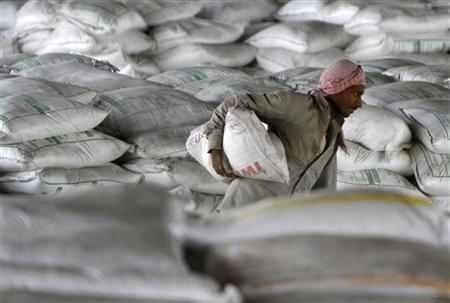
The Competition Commission of India says that cement firms met regularly to fix prices, control market share and hold back supply. Cement firms deny this and have filed an appeal.
That cup of coffee you are drinking could be 30 per cent more expensive thanks to alleged price fixing by the cement industry. Ditto with the jeans you're wearing, the facial you just had and the house you just built.
The above number is theoretical -- it could even be higher -- but the accusations from the Competition Commission of India (CCI) are not.
The Commission claims that cement companies in India had been organising themselves in a cartel for a while now, colluding, during industry body meetings, to fix production levels as well as the price of a bag of cement -- in this case doubling it between 2004 and 2011 -- so they could make windfall, illegal profits. Also decided during these meetings, says the Commission, was market share.
...
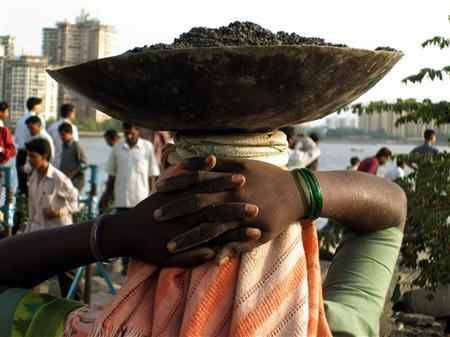
If the allegations turn out to be true, everything that involves construction and infrastructure, from the taxes you pay for your roads, to the rentals you pay for your stores -- and by extension the products you buy from those stores -- are much more expensive, thanks to this illegal activity.
Consequently, the CCI has slapped a fine totalling Rs 6,307.32 crore (Rs 63.07 billion) on the top-10 cement companies here and the industry body Cement Manufacturers' Association (CMA).
The companies accused in CCI's report have denied all allegations of cartelisation and are determined to appeal the judgement.
...
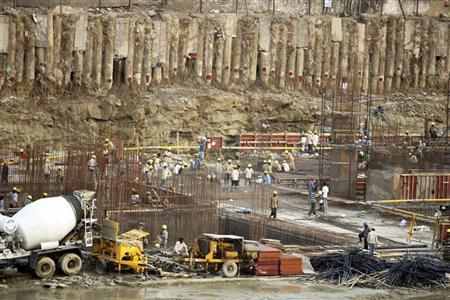
The art of collusion
What is a cartel?
Cartels are agreements between enterprises to attempt to control the production, distribution, sale and price of goods and services.
This could involve, say, allocating market share or sales quotas, or engaging in collusive bidding or bid-rigging in one or more markets.
End result
For consumers, cartelisation results in higher prices, poor quality and less or no choice of goods and services.
...
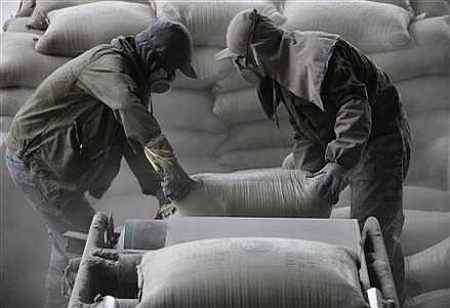
Global instances of cartels
In 2000, the European Commission fined five companies euro 110 million for global price-fixing cartel for lysine. Lysine is the most important amino acid used in animal foodstuffs for nutritional purposes.
EU imposed a fine of euro 992m on four lift and escalator manufacturers for partaking in market-rigging and price-fixing.
The EU imposed a fine of euro 855.2m on various pharmaceutical companies for colluding to fix the price of vitamins.
...

Current cartel probes by CCI
The top-five Indian tyre manufacturers, who control 95 percent of the market, along with the Automotive Tyre Manufacturers' Association, allegedly colluded to fix prices.
Cartelisation by domestic jute industry
It is alleged that 8-10 big polyester manufacturers such as Grasim, Modi Polymer and Bombay Dyeing, collude together to dictate pricing and sale terms in the market.
...
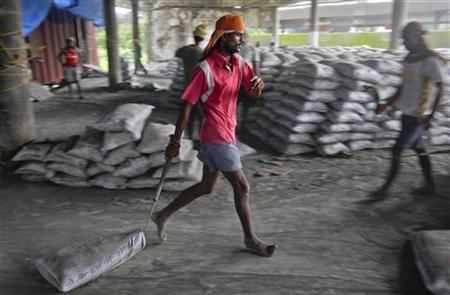
The trigger
It all started when the Builders Association of India (BAI) lodged a complaint with CCI in July 2010, alleging restrictive trade practices and collusive price fixing in the cement industry.
The BAI's charges were mainly against Cement Manufacturers' Association and 10 major cement manufacturers.
BAI in its complaint alleged that despite having large capacities, these companies formed a cartel and used the platform of CMA to synchronise the reduction of utilisation levels, thereby limiting supplies to the market, and hiking the prices in tandem.
While all the cement companies have their manufacturing units located in various parts of the country with different input and transportation costs, the cement companies decided to hike prices of the commodity uniformly and simultaneously, BAI alleged.
...

BAI also said that though the companies expanded their installed capacities, the utilisation did not reflect a relative rise.
"The informant (BAI) has averred that in the normal course, in an unregulated market, if the demand is constant and the production of the goods increases, the price of the products should reduce particularly when cost of production also reduces," the order noted.
...

Under the scanner
Following complaints from BAI, the CCI directed its director general (DG) of investigation in September 2010 to probe the matter and submit a report.
According to a CCI official, the investigations were carried out based on various inquiries, analyses of communications between the cement companies and dealers, and data from various sources.
In the absence of no direct evidence, the DG also analysed circumstantial evidence, including behavioural indicators to find out whether there was any agreement and concerted action by manufacturers to raise prices in tandem.
The DG, in its report submitted on 31 May 2011, concluded that, yes, cement companies in fact entered into anti-competitive agreements in order to control the supply of cement. It also said the companies used the platform of CMA and indulged in collusive price-fixing.
...
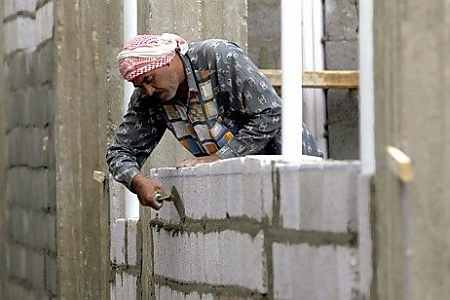
From its analysis of the price data for cement, the DG observed that the price of cement in the country rose faster than its input cost, as there had been a continuous positive growth in the cement prices over the last five to six years.
There has also been a continuous divergence between the cement price index and the index price of various inputs like coal, electricity and crude petroleum, and the gap has widened since 2000-01, it said.
The DG's report highlighted a curious fact -- that the price of cement rose from Rs 150 per bag in 2004-05 to Rs 300 a bag by March 2011 despite the fact that the cost of sales has increased by merely 30 per cent.
...
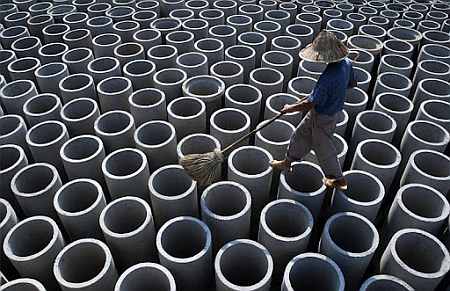
Also, the production capacity of these companies ramped up considerably -- increasing from 157 mmt in 2005-06 to 287 mmt by the end of March 2011.
However, the capacity utilisation has been on a continuous downward trend from 2008-09, coming down to 73 per cent by 2010-11.
What's more, the investigator gathered that the cost of production does not play an important role in determining cement prices, except when there are substantial changes in taxes.
...
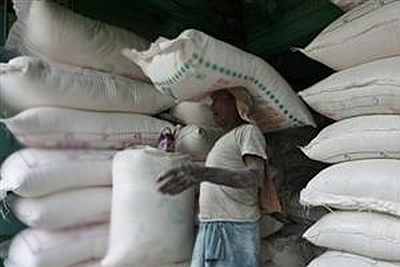
"The DG has found in course of investigation that the change in price is mainly effected by external factors and not by internal ones like cost, production, etc." the CCI order said.
From an analysis of the cost audit reports of these cement companies, the DG observed that the cement industry was able to put up a consistently good performance, realising 26 per cent operating margins -- versus 16 per cent for the rest of the industry -- during the last three to four years.
...
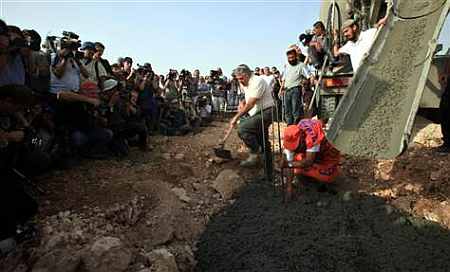
How the cartel worked
According to BAI's submissions to the CCI, major cement producers along with CMA divided the whole market into five zones, which enabled them to control the supply and fix prices by forming a cartel.
According to DG's investigation report, CMA formed a high power committee and the prices of cement were discussed in its meetings. Even companies like ACC and Ambuja Cements, which had resigned from CMA, continued to participate in such meetings.
The CMA apparently nominated different companies in 34 different centres to collect and disseminate the retail as well as the wholesale price. This information is either collected on phone or through e-mails.
Though CMA argued that it did so for the Department of Industrial Policy and Promotion, the DG maintains the common platform of CMA was used for entering into anti-competitive agreements by companies.
...

The final word
Based on the finding of the DG's probe and after listening to companies, the competition watchdog imposed a heavy penalty of Rs 6,307.32 crore (Rs 63.07 billion) on the 10-top cement companies, including ACC, Ambuja Cements, Ultratech and Jaypee Cements as well as CMA, accusing them of creating a cartel.
The CCI has found these cement manufacturers in violation of the provisions of the Competition Act, 2002 which deals with anti-competitive agreements, including cartels.
Grasim Cements (now merged with Ultratech Cements), Lafarge India, JK Cement, India Cements, Madras Cements, Century Cements and Binani Cements are among others found guilty and penalised.
...
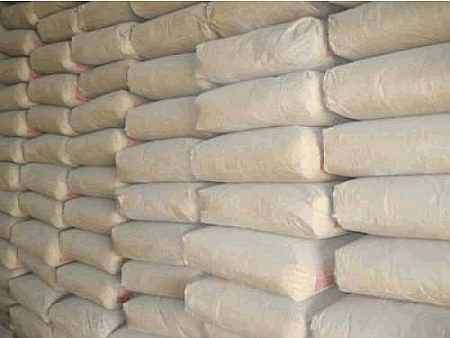
"...The Commission finds that opposite parties have institutionalised the system of sharing the prices, capacities and production among each other, using the platform of CMA to limit production and supplies and determine the prices of cement in the market," the CCI order said.
The CCI ruled that each of the 10 firms will have to pay a fine of 50 per cent of their profit during 2009-10 and 2010-11 within 90 days. The penalty will go to a government consolidated fund.
In its order, CCI has also directed companies to 'cease and desist' from indulging in any activity relating to agreement, understanding or arrangement on prices, production and supply of cement in the market.
...
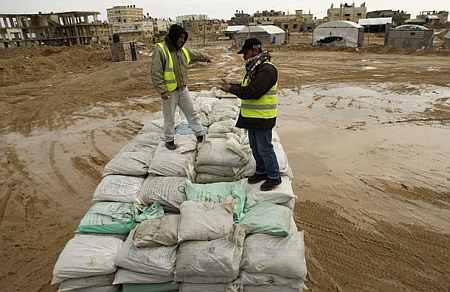
Fitch ratings, which has maintained a negative outlook on the industry over the last two years, because of excess capacity and muted demand, says the impact on credit profiles of most of these entities is likely to be minimal, given their relatively low financial leverage (net debt/EBITA).
According to the agency, the top-five players -- Ultratech Cement Limited, ACL, ACC, ICL and Madras Cements -- accounting for 50 per cent of the industry capacity "enjoy a better cost structure, driven by higher level of vertical integration and locational advantage with respect to sourcing of raw materials and market access."
Others have a weaker cost structure and moderately high debt levels. "Globally, most markets have significant consolidation and this move by the CCI may indirectly help the Indian cement industry in correcting this structural imbalance," it adds.